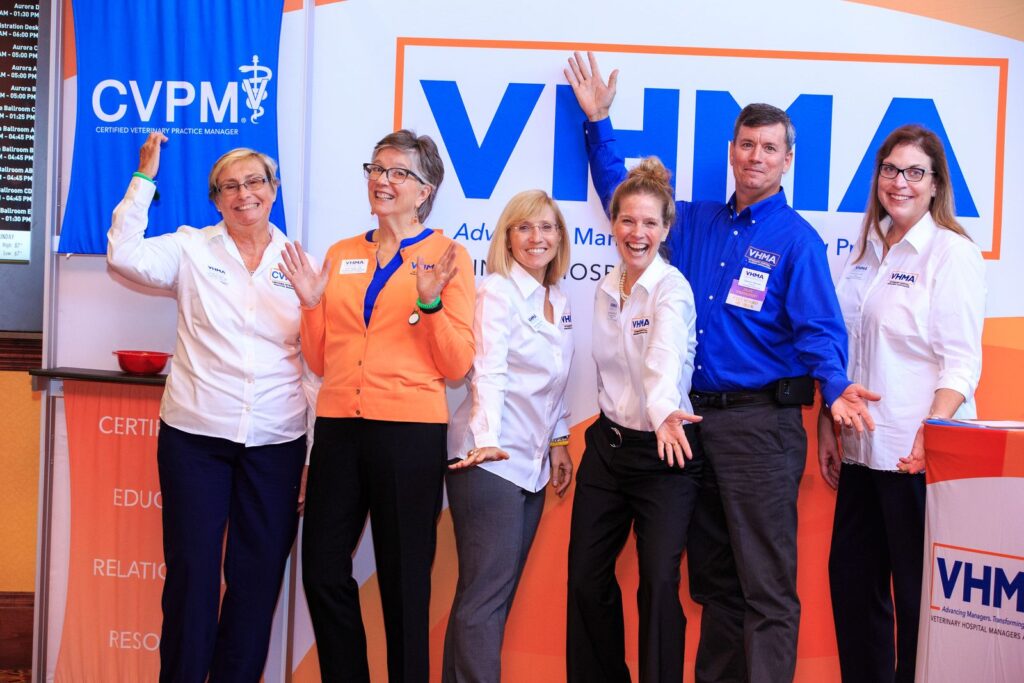Healthy Pets, Healthy Careers: Christine Shupe, CAE, Veterinary Hospital Managers Association

While most association professionals scrambled to flip their workspaces from in-office to remote in a matter of days this past spring, Christine Shupe, CAE has been managing associations and staff remotely – and making it look easy – since 2003. As the executive director of the Veterinary Hospital Managers Association (VHMA) since 1998, Christine works to ensure business managers of veterinary hospitals, clinics and private practices have the tools and knowledge they need to care for their business while the veterinarian cares for pets. She has also run her own management firm, CQS Management Service, LLC, since 2003.
Association Adviser talked with Christine about supporting members’ educational needs, hosting a virtual conference and what it’s like to run a 100% remote-work company.
Association Adviser: Tell us about your professional background. How did you begin working in associations?
Christine Shupe, CAE: I’ve always been interested in politics and studied political science in college. During my last year of college, I had the opportunity to participate in an internship program at the New York State Assembly in Albany, New York. Through that internship I secured a job working for the law firm, Shea and Gould, which lobbied at the state legislature. That led to a legislative aide position for an Assemblywoman from upstate New York. Through my job at the Assembly I met a colleague who worked for an association management company that also lobbied the state legislature. They were looking to fill a position, and I thought their work was a good niche given my experience and background.
How did you make your way to VHMA?
CS: At the association management company I worked for several different state professional organizations. VHMA was a client of the firm, and when their executive director left her role with the VHMA, I was given the opportunity to take on the position. I am proud to say that I am celebrating my 22nd year working for the VHMA.
What is the role of a veterinary manager?
CS: Veterinary hospital managers are business professionals. Their job is to provide oversight and management of the day-to-day operations of the veterinary hospital. Their strategic focus on the management of the hospital makes it possible for the health care team to focus on veterinary medicine. They serve as a partner, and work hand-in-hand with the practice owner, typically a veterinarian, to help realize their vision for the business. They ensure that the day-to-day tasks serve that mission and grow the business. They oversee everything from general practice operations, to inventory, to human resource management, to legal compliance, marketing, and ensuring that quality of care meets current standards for pet health care. They work for veterinary businesses of all sizes, from one-doctor private clinics to multi-facility, corporate veterinary practices.

AA: How does VHMA support its members?
CS: We focus on three areas: Education, certification, and networking. Like any association, we make sure our members have current information about best practices, trends, how the industry is changing and how to understand client needs. Some of our education is in person but we also host online education sessions. At the beginning of the pandemic, we were instrumental in helping managers and practice owners get the information they needed to transform their business operations, given new health guidelines and provide business continuation funding through PPP loans. It was a significant transition from welcoming clients into their hospitals and clinics to offering curbside service.
AA: Curbside service for pets?
CS: Yes. Clients call or text their veterinarian’s office when they arrive for an appointment. Staff comes outside to retrieve the pet from the client’s car and takes it inside for the exam or procedure. The veterinarian calls the client during or after the procedure with their care recommendations, and staff returns the pet to the client’s car when the appointment is finished. VHMA makes sure that managers have the resources and tools they need to make this process run smoothly. I am extremely proud of the way our members quickly tackled the challenges of the pandemic so that they could remain a viable business for their staff and clients, and support the community’s needs.
We’re seeing some businesses return to in-building service, depending primarily on geographical location. The majority are still curbside service.
AA: How does VHMA serve members through your other two areas of focus, certification and networking?
CS: We offer a certification program for practice managers, the Certified Veterinary Practice Manager (CVPM) program. Providing good healthcare is only one part of a successful veterinary business. You have to manage it well, also. In other words, you have to have a healthy business to have healthy pets! Our certification program creates an industry standard for veterinary practice managers. Watching our certification program grow over the last 20+ years has become a highlight of my career with the VHMA.
In terms of networking, we provide a collaborative network where managers can connect with peers and support each other. We have a robust community, both online and offline. Our online community sees 20 to 50 posts a day and is where the bulk of networking happens between in-person events.

AA: Your annual conference is going virtual this year, and will span almost an entire month. How have members reacted to the planned schedule?
CS: They’re looking forward to it. Spreading out our conference sessions over a month helps alleviate the digital fatigue many people are feeling these days. Plus, as veterinary practices are considered essential businesses, they are pretty busy right now. Spacing out our conference offerings allows members to attend while still operating their day-to-day businesses. They can’t take their eye off the ball, so we adapted our format so they don’t have to.
AA: Are you concerned that the new digital format will make attending the conference more difficult?
CS: No, not at all. We’ve been offering virtual programming regularly for years. Our virtual events are extremely popular – we host 300 to 500 attendees per month! We are mixing up the program formats for the conference, using technology that supports interactive small group sessions, chat and video, so the conference sessions can be more interactive and conversational for the attendees.
AA: Does VHMA have any specific goals or hopes for this virtual format, now or in the future?
CS: Our members love our conferences because of the network opportunities that allow them to learn from one another. Sharing experiences with each other through in-person roundtables is a very popular format. We want people to feel they’re getting the same experience in a digital format. We think the virtual experience and the knowledge attendees will take away will closely mirror the in-person experience. We want people to connect and talk freely. Small virtual groups will be helpful for that end.
AA: VHMA promotes “private career conversations” as part of its conference. What are those? How do they benefit members?
CS: Our Career Conversations program helps members understand what career opportunities are available to them within the veterinary industry. We bring in veteran managers whose careers represent different types of roles within the industry to talk with others about their career paths and professional experiences. These veteran managers may have worked in private practice, for an industry partner, for a corporate practice, or a combination of all three. The objective is to present the potential for career opportunities in veterinary management, and to demonstrate to younger, aspiring managers how to be more mindful early on about where they could go with their careers and what their professional needs will be at each stage.

At our digital conference, these conversations will take place over phone and video. They would be one-on-one meetings in person, but this year, we’re offering multiple avenues for these mentor-mentee pairs and letting them select the best way to connect.
AA: You founded and manage your own association management company, CQS Management Service, LLC. What inspired you to form your own company?
CS: When my husband and I moved from New York to Florida for his job, I started my company so I could continue to work for VHMA but not be constrained to any single location. Our current team of seven reside all over the country – Florida, North Carolina, Texas, Montana. CQSMS has been a remote work company since 2003! While most associations were still figuring out how to work virtually at the beginning of this pandemic, we were already functioning that way. That made it easier for us to spend all of our time providing the resources our members needed. Everything we do is Internet-based: monthly virtual meetings, cloud-based storage platforms, VOIP phone system. I recruit through ASAE and find qualified team members who want to work remotely. We meet up in person at events and keep in touch through plenty of email, conference and video calls.

AA: What keeps you up at night?
CS: Making sure that the association is serving its members, and remains relevant and valuable. There’s a lot of change within every industry, and we’ve certainly seen it in the veterinary industry. There’s increased competition for the products and services traditionally offered by associations. While increased resources are great, we need to make sure our management professionals have a strong voice and are recognized for the value they bring, not only to their practices but also the industry.

